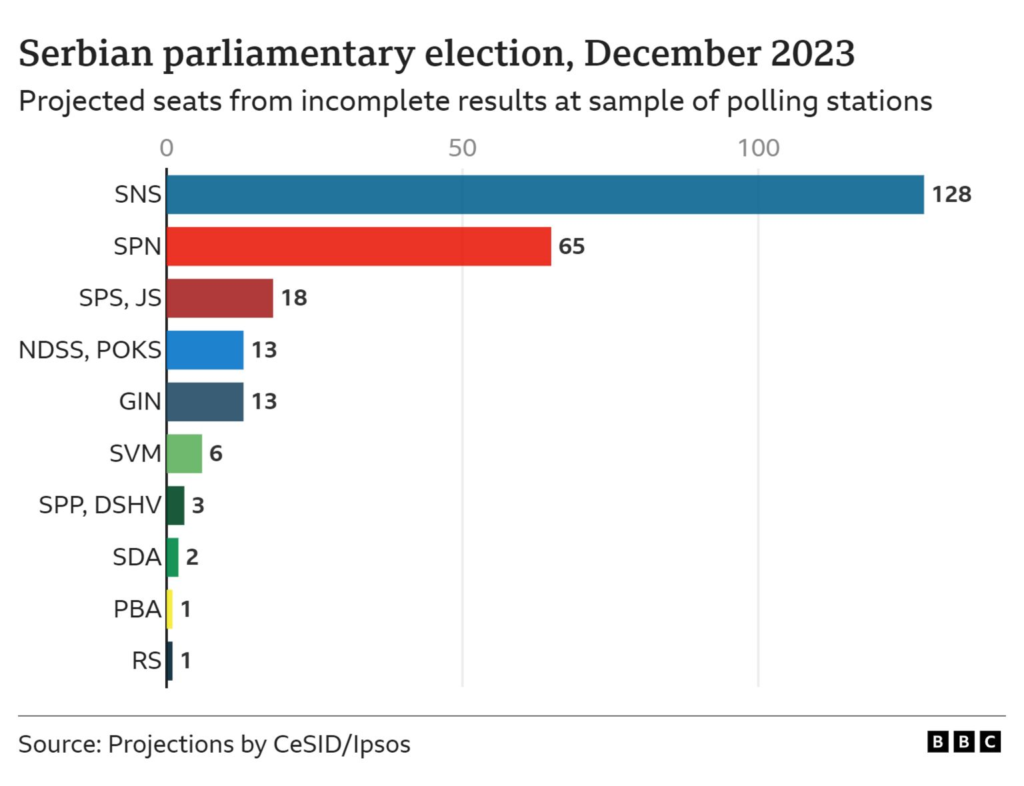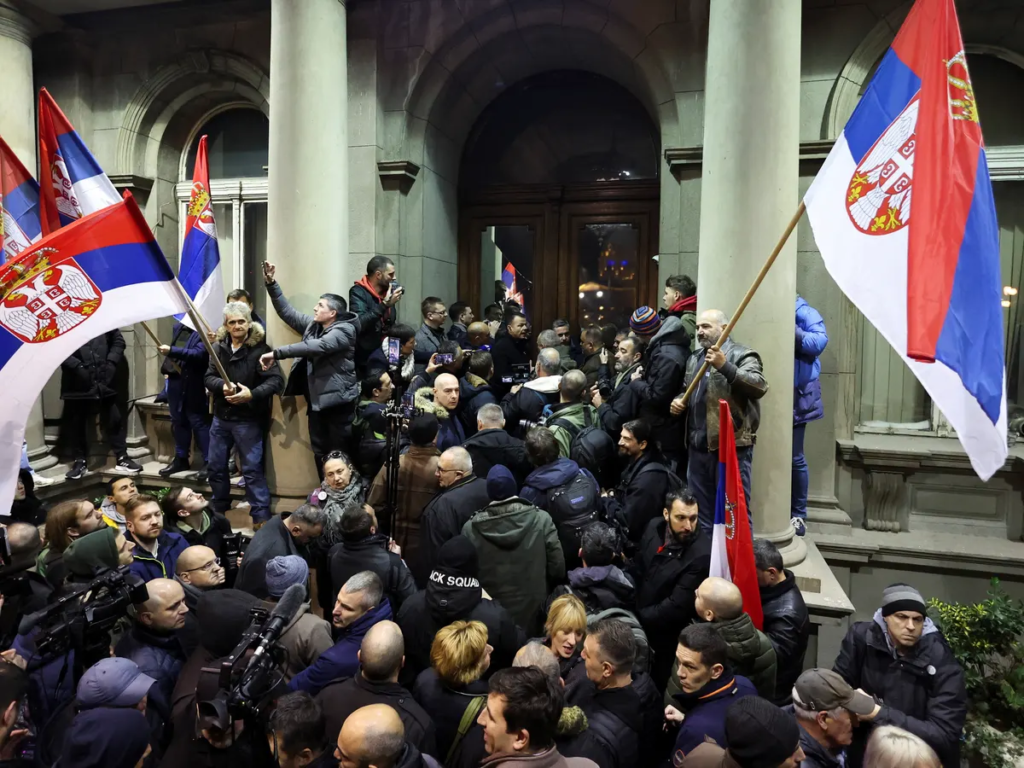This week’s podcast had Dr Alexander Mesarovich discuss the Serbian elections, which took place towards the end of 2023. As discussed in the podcast, Aleksandar Vučić’s victory was not met with celebration, instead protests filled the streets of Belgrade, and other cities in Serbia, accusing Vučić’s party of fraud and calls for the elections to be annulled. As dramatic as this was to witness on the news, many are left wondering why a country of under 7 million people has attracted so much attention, particularly on a podcast about key international risks. In this article, we will outline some of the background, the international risks associated with the 2023 Serbian elections, and why they should matter to you.

‘Fair’ democratic practices called into question in Serbia
Just 18 months after the last election in Serbia, Vučić’s populist party, the SNS claimed a decisive victory in the December elections, winning 47 percent of the votes, with its main opposition, the Serbia Against Violence coalition, taking 23 percent. Democratically, the SNS victory seems decisive, however many international observers have raised concerns about how fair the elections truly were. Vladimir Obradović, Serbia Against Violence’s mayoral candidate posited that ‘pressure on voters, buying votes, voters from other areas and even countries are only some of the irregularities that were observed and reported by independent monitoring missions’. He added that results of the elections in Belgrade do not represent the free will of the Belgrade citizens’, and as a result, demanded new elections with equal conditions for all parties.

Serbia’s election calling out the risk
Whilst uproar from opposition following an election loss seems to be commonplace in modern democracies, internationally, observers have also called the legitimacy of these elections into question. Reinhold Lopatka, the leader of the Organization for Security and Co-operation in Europe (OSCE) observer mission stated that, whilst the elections were technically well administered, they were “dominated by the decisive involvement of the president which together with the ruling party’s systemic advantages created unjust conditions”. This mission also claimed that the campaign “was marred by harsh rhetoric, bias in the media, pressure on public sector employees and misuse of public resources”.

As a result of these claims, it remains difficult to trust the legitimacy of Serbia’s democratic processes. In fact, the Center for Research, Transparency and Accountability, an independent organisation, has stated that “Considering the scope and diversity of electoral abuses in Belgrade,” the organisation said, “we conclude that the results of the Belgrade elections do not reflect the freely expressed will of voters living in Belgrade’; however, despite these concerns, Vučić is likely to remain in power for the time being. Internationally, as we heard from Dr Alexander Mesarovich, Serbia remains fairly irrelevant on the international scale, especially in light of other geopolitical events taking place today. As a result, Western reactions to the alleged fraud have been ‘muted at best’, setting a precedent to the rest of the world that such mistreatment of democratic practices will not be dealt with by the West with anywhere near the urgency or ferocity it warrants.
On a larger scale, such a muted response poses enormous international risks for Europe. Dimitar Bechev has claimed that it is no longer possible for the European Union to remain neutral in the face of these elections. With Hungarian leader Viktor Orbán’s bid for EU Council presidency sparking fears amongst Eurocrats, Serbia’s bid for EU membership looks more hopeful. Brussels must therefore ensure Serbia aligns fully with EU values, rather than straying towards Vučić’s other partners in Russia. Additionally, with states such as Austria and Germany facing growing threats of populist regimes becoming more entrenched in their political systems, the EU must remain steadfast in ensuring its values, and the values of fair democracy are upheld throughout its members. Failure to do so poses vast international risks, not just in Europe, but worldwide.
The International Risk of Democratic Backsliding
The turbulence following the Serbian elections highlights a pivotal moment for the Western Balkans and underscores the fragile nature of democratic institutions in the face of populism and authoritarian influences. The international community’s reaction, or lack thereof, to Serbia’s political unrest not only signals potential shifts in diplomatic relations but also raises alarms about the global commitment to democratic norms. The relative silence from many European countries could be seen as acquiescence to democratic backsliding, a stance that bears significant international risk for the precedent it sets.
Serbia is in a strategic position as a candidate for European Union membership. The political stability in Serbia, and adherence to democratic principles, should be under intense scrutiny. The EU’s approach to Serbia’s election fallout will be a test of EU foreign policy and its capacity to uphold democratic standards within its prospective members. Ensuring that Serbia aligns with these values is not just about expanding the EU; it’s about strengthening the foundations of democracy in a region with a complex history and geopolitical significance. The handling of Serbia’s electoral disputes will have far-reaching implications, potentially affecting the EU’s credibility, the geopolitical balance, and international risks in Southeast Europe.